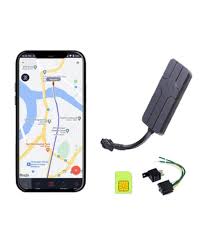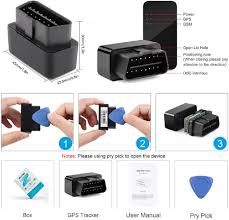An
OBD GPS tracker is a device that combines two technologies:
OBD (On-Board Diagnostics) and
GPS tracking. Here’s a brief explanation of each component and how they work together:
1. OBD (On-Board Diagnostics)
- OBD is a vehicle's self-diagnostic system that monitors its engine and other critical components. It provides real-time data and trouble codes that can be accessed using an OBD scanner or reader.
- Most vehicles manufactured after 1996 come equipped with an OBD-II port, which allows devices to plug into it and retrieve information such as:
- Vehicle speed
- Engine health (RPM, temperature, fuel consumption)
- Error codes (if there are any issues with the engine or vehicle systems)
2. GPS Tracking
- GPS (Global Positioning System) is used for real-time location tracking via satellites.
- GPS trackers can record and transmit the exact location of a vehicle, providing useful data for fleet management, stolen vehicle recovery, or personal monitoring.
3. OBD GPS Tracker
- An OBD GPS tracker combines both of these features. It plugs directly into the OBD-II port of a vehicle, typically located under the dashboard.
- It tracks the location of the vehicle through GPS, while also providing vehicle diagnostics by accessing the data from the OBD system.
Key Features of OBD GPS Trackers:
- Real-Time GPS Tracking: Allows you to monitor the location of your vehicle in real time via a smartphone app or online dashboard.
- Vehicle Health Monitoring: Provides information about the engine's status, fuel consumption, tire pressure, and any trouble codes that might indicate a problem.
- Driving Behavior Insights: Can track driving patterns such as hard braking, rapid acceleration, and speeding.
- Geofencing: Set virtual boundaries for the vehicle, and receive alerts when it enters or leaves a specific area.
- Notifications and Alerts: You may receive alerts for things like low battery, engine trouble codes, or if the vehicle moves outside a designated area.
Popular Uses:
- Fleet Management: Businesses that manage a fleet of vehicles use OBD GPS trackers to monitor their vehicles' location and condition.
- Stolen Vehicle Recovery: If a car is stolen, the tracker provides its real-time location to help law enforcement recover it.
- Personal Vehicle Tracking: Owners can keep track of their own vehicle's location and health.
Pros:
- Easy installation (just plug it into the OBD port).
- Provides comprehensive vehicle data.
- Helps with maintenance and timely repairs by monitoring engine health.
- Offers peace of mind with real-time location tracking.
Cons:
- Only compatible with vehicles that have an OBD-II port (most cars manufactured after 1996).
- Can be disabled if someone knows how to disconnect or tamper with the OBD-II port.
If you're interested in purchasing an OBD GPS tracker, look for one that supports features such as real-time tracking, mobile app access, and vehicle diagnostics, and ensure it’s compatible with your vehicle. Read more... Car monitoring system




Comments
Post a Comment